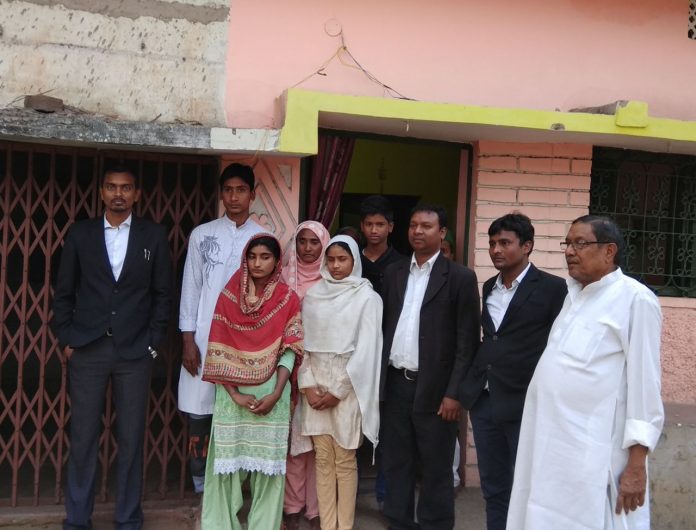Shadab Ansari has been practising law for over a decade, but never before did he resort to leaving the court via the back gate after a day’s proceeding. As a lawyer in Ranchi, he had also travelled to Ramgarh located 50 km away numerous times on his bike and public transport, but never before did he resort to looking over his shoulder so often. Since July last year, he along with two other lawyers–Raju Hembrom from Ranchi and Mumtaz Ansari from Dhanbad–have been watching over their back, double-checking everything around them and living partly in feat but all for a noble cause.
Thanks to these three lawyers from the Human Rights Law Network, the family of Alimuddin Ansari, who was mercilessly lynched in Ramgarh last year over alleged charges of transporting beef, have got justice. On March 21, a fast-track court in Ramgarh awarded life sentences to 11 people most of whom belonged to Hindu right-wing organisations.
The 11 convicted include a district media cell in-charge of BJP, Nitayanand Mahto and at least three members of the local gau Raksha Samiti – Santosh Singh, Deepak Mishra and Chhotu Verma. The others are Sikander Ram, Vicky Saw, Raju Kumar, Vikram Prasad, Kapil Thakur and Uttam Kumar.
On June 29, 2017, 45-year-old Alimuddin Ansari was attacked by a mob and his Maruti van set afire Bazartand village in Ramgarh. He was initially taken to Ramgarh’s Sadar hospital by the local police and later shifted to Rajendra Institute of Medical Sciences (RIMS) in Ranchi, where he died within minutes of being admitted.
But beyond the rather seminal event of seeing 11 people being awarded life imprisonment, there are three crucial factors which ensured that for once, the family of a person lynched to death got justice: the fact that the trial was conducted in a fast-track court, the fact that three lawyers stood up against the right-wing forces and the most important fact: a police force that actually followed the constitution and stayed true to the case.
“Always knew this case will be tough, but we never gave up”
Shadab Ansari came to know about the brutal lynching of Alimuddin Ansari like the rest of the nation: newspaper articles and WhatsApp videos. On July 13, following strong agitation from locals and the heightened media scrutiny, the BJP government referred to the case to a fast-track court. This, according to Ansari, was the first sign that there was a chance the family of Alimuddin might get justice. “We all know the stories of delays in the normal courts but when the matter came to a fast-track court, we knew that regardless of what the outcome will be, at least the case will move at a good pace,” he told TwoCircles.net.
But even then, for the family of Alimuddin to have any chance against the right-wing machinery, there was a need for good, honest lawyers who were ready to take the ‘risks’, and this is where the Human Rights Law Network stepped in. Ansari says, “We met the family who told us that there was no one to represent them and given what they had gone through, they did not have much money. But we at HRLN decided to fight the case regardless.”
Soon, however, Ansari realised that the element of danger was almost inbuilt in a case like this. “When I went to the court for the first time, I saw huge crowds supporting the accused while the family of Alimuddin was hopelessly outnumbered…we realised that we were not fighting just against the accused but an entire machinery,” he recalls. A resident of Ranchi, he would often go on the bike to the court in Ramgarh. “I and Rajiv Hembrom would always be told by our well-wishers: be safe and stay alert. We never knew when we might be attacked. Thankfully, no such thing happened but I can say that there was never a moment we could relax,” says Ansari.
In cases like these when the accused are known to have the support of politicians, Ansari also says he was impressed with the role played by the police. Remember, there was video evidence in the case of Pahlu Khan also, but in that particular case, the Rajasthan Police’s role was rightly questioned after it exonerated all the accused. “As a lawyer, it is not uncommon to see how the police try to hijack a case or make it weak due to political pressure…but in this case, the police followed the constitution right from the start and remained resolutely unbiased,” he says. “Do not forget that the case was still of the police…as private lawyers, we could only assist but it was the Police that had to take the lead,” says Ansari.
Three police officers who were also eyewitnesses to the case gave honest and exhaustive statements to both the Investigating Officer and while testifying in court, making the case against the accused extremely strong. Apart from that, the charge-sheets prepared by the Police were strong and the Superintendent of Police, Ramgarh, Kishore Kaushal (transferred in February 2018) was personally overseeing the case proceedings.
The accused can, of course, appeal against the judgement in High Court. Ansari says they will adopt a wait-and-watch policy for the time being. “We are happy with the verdict,” he adds.
Courtesy: Two Circle
